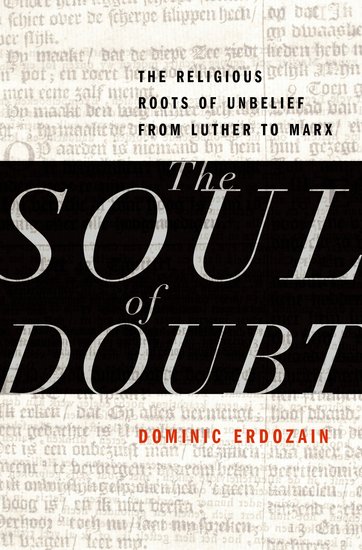Dominic Erdozain ziet in Spinoza vooral een christen
 Dominic Erdozain, The
Soul of Doubt. The Religious Roots of Unbelief From Luther to Marx. Oxford University Press, 2015 – books.google
–
Dominic Erdozain, The
Soul of Doubt. The Religious Roots of Unbelief From Luther to Marx. Oxford University Press, 2015 – books.google
–
Zoals Charles Taylor claimde dat het secularisme, zeker in z’n moraliteit afgeleid is van de ethiek van het christendom, wil Erdozain laten zien dat centrale figuren die aan de wieg van het moderne secularisme stonden— Spinoza, Voltaire, Darwin en Marx —niet zozeer gemotiveerd waren door rationele en wetenschappelijke motieven, maar door vooral morele en dat ze die aan het christendom ontleenden. Hun ethiek en empathie lijken zó christelijk dat die wel van christelijke huize moeten stammen. [Het jodendom wordt dan even over het hoofd gezien].
In zijn inleiding, die hij op academia.edu heeft geplaatst, schrijft Erdozain over zijn in beginsel sympathiek uitgangspunt:
“My concern is not the
theological question of what Christendom was or claimed to be. It is fair
analysis of the critics, heretics, and troublemakers, whose motives in rattling
what has passed at various times for religious orthodoxy have been as
consistently misrepresented by their admirers as their enemies. Voltaire is a
case in point; Spinoza is the supreme example. Very few of the skeptics
encountered in these pages were atheists, and those that were continued to
measure religion by Christian standards.
Conscience outlived conscious belief. One of my claims is that modernity has
been characterized by the internalization of religious ideas, not their
disintegration."
Hoofdstuk drie, “The Metaphysics of Mercy: Calvin and Spinoza”, gaat vooral en uitgebreid over Spinoza. De auteur over dat hoofdstuk in zijn inleiding:
Chapter 3 charts a similar transition from a heart-centered Protestantism to a kind of spiritual rationalism in the seminal contexts of the English civil war and the newly liberated Dutch Republic. I show that Spinoza was not only familiar with the dissolvent thought-world of radical Protestantism but intimately connected to it, developing both his biblical criticism and his much-feared metaphysics as a reaction to the overbearing Calvinism of the Dutch Reformed Church. Far from seeking to destroy Christianity, I argue that Spinoza was trying to restore its original emphasis on love and mercy. The central figure of the Ra ical Enlightenment was a man of fervent piety, challenging confessional authority from a stance of intensified, not attenuated, spirituality.
Dit lijkt op zich allemaal wel aardig treffend, maar de auteur gaat wel erg ver, zoals Jennifer Michael Hecht in zijn review “How Secular Are Secular Ethics?” laat zien. Daaruit deze alinea:
Erdozain can find Christianity anywhere. He reports that everyone’s favorite 17th-century Jewish atheist, Spinoza, "clung" to his friendships with pious Christians "as a spiritual lifeline." As a Jewish atheist, I’ll have to ask him to get his own Spinoza. The excommunicated Jew and author of the Ethics, founder of modern philosophical rationalism, is shown, in The Soul of Doubt, as believing in miracles and so frequently enjoying discussions with Christians that we can, with a wink, call him one. Erdozain accepts that "scholars continue to identify the sixth chapter of the Treatise as a ‘sweeping denial of miracles,’ " and that authorities on the subject accept Spinoza’s denial of the supernatural. But he disagrees: "Spinoza did not ‘deny’ either miracles or the supernatural. He voiced skepticism about events perceived to have been miracles, urging that signs and wonders are typically natural events. … Far from a denial of providence, Spinoza’s metaphysics emerged from a positive and fervent understanding of divine activity in the world."
Maak kennis met de auteur via deze korte video:
Dominic Erdozain taught "Finding Liberty: The Christian Roots of the Modern Conscience" as part of Regent College's Summer Programs 2014. During the year, he teaches at the Candler School of Theology at Emory University in Atlanta where he is completing a book titled The Soul of Doubt: The Religious Roots of Unbelief. His other book is The Problem of Pleasure: Sport, Recreation and the Crisis of Victorian Religion, In 2006, he was appointed Lecturer in the History of Christianity at King's College London, where he remains a Research Fellow.

